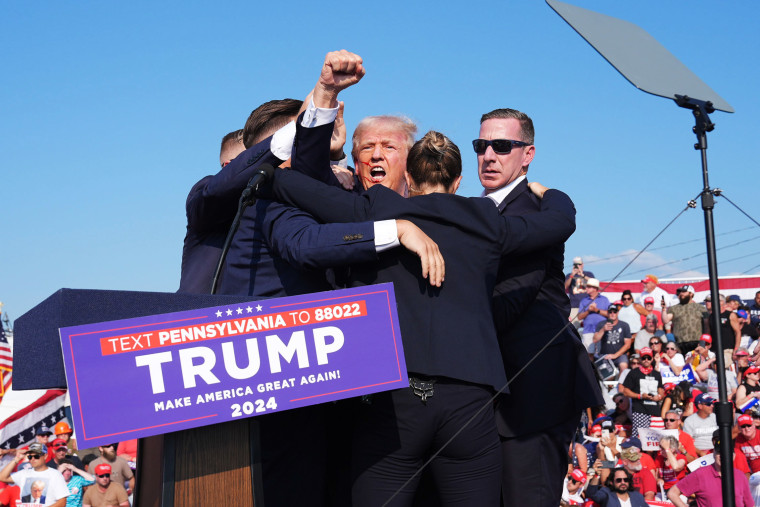
Washington The final report of the House task force that looked into the assassination attempts against Donald Trump was released on Tuesday. It included dozens of recommendations, such as the Secret Service recording all radio communications and reducing protection for foreign leaders so that the president and other high-ranking U.S. officials could be protected.
With regard to the July 13 assassination attempt in Butler, Pennsylvania, where a gunman’s bullet grazed Trump’s ear at a campaign rally, the 180-page report has 25 suggestions. Eleven broad suggestions for the Secret Service are also included.
The terrible and startling events in Butler, Pennsylvania, were avoidable and shouldn’t have occurred, according to the Task Force’s findings. However, the 13-member committee stated in its conclusion that there was not a single instance or choice that permitted Thomas Matthew Crooks to come dangerously close to killing the former president. The former president and everyone present at the campaign event were put in grave danger as a result of a combination of preexisting conditions that compromised the effectiveness of the human and material resources deployed on July 13, 2024, as well as numerous planning, execution, and leadership failures that occurred on and before that date.
Under the leadership of Rep. Jason Crow, D-Colo., and Chairman Mike Kelly, R-Pa., the task force commended the Secret Service for stopping a second attack on Trump in Florida later that year: On the other hand, what happened in West Palm Beach, Florida on September 15, 2024, showed how well-executed security systems can prevent an assassination attempt.
The bipartisan panel recommended, among other things, that the Secret Service should record all radio communications, something that did not occur in Butler on July 13. According to the study, the lack of radio records or recordings severely restricts the capacity to reconstruct events for the purposes of investigation or evaluation.
In order to concentrate on the USSS’s main responsibility, which is to protect the President and other important U.S. leaders, the panel also suggested that Congress, the Homeland Security Department, and the U.S. Secret Service examine the protective role the USSS plays for foreign leaders and determine whether such responsibilities can be transferred or eliminated.
The assassination task force also recommended that the Secret Service look into hiring more people or offering flexible assignments during times of high pressure so that the agency can adjust to changing circumstances; give non-Secret Service employees who are helping the USSS on-site more thorough training; and create and codify a procedure for handling USSS disputes with protectees’ staff.
Regardless of political party or protectee, the study noted that during our inquiry, a number of Secret Service personnel voiced dissatisfaction when negotiating with staff.
In addition to interviewing dozens of witnesses and granting access to 18,000 documents, the task force stated that the FBI only gave it access to 81 of the more than 1,000 summaries of witness interviews.
Several decision points that, if handled differently, might have stopped gunman Thomas Crooks from firing eight shots at the Butler rally were highlighted by the task team, according to the report.
According to the task force, Crooks was able to elude law enforcement, climb on the roof of the American Glass Research (AGR) complex, and open fire because a high-risk area adjacent to the Butler rally venue was not secured.
According to the task force, the Secret Service also failed to provide state and local partners with clear instructions regarding which organization was in charge of securing the area. According to the group, local sniper teams stationed on the AGR property felt they were in charge of keeping an eye on the rally site and attendees rather than the region beyond the protected boundary, and concerns over a shortage of personnel were voiced but not adequately handled.
The campaign event itself and the days leading up to it were not the only instances of the shortcomings that resulted in the tragic events of July 13. The task committee stated that the particular failures mentioned above could have happened because of preexisting problems with training and leadership.
In addition to specific intelligence about a long-range threat, the task force stated that Secret Service personnel with little to no experience in advance planning roles were given significant responsibility, even though the July 13 event was held at a higher-risk outdoor venue with numerous line-of-sight issues.
Furthermore, the boundaries of their duties were unclear to several Secret Service personnel in important advance planning positions.
Note: Every piece of content is rigorously reviewed by our team of experienced writers and editors to ensure its accuracy. Our writers use credible sources and adhere to strict fact-checking protocols to verify all claims and data before publication. If an error is identified, we promptly correct it and strive for transparency in all updates, feel free to reach out to us via email. We appreciate your trust and support!
